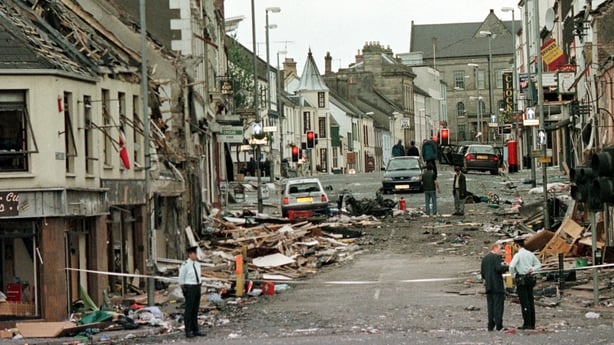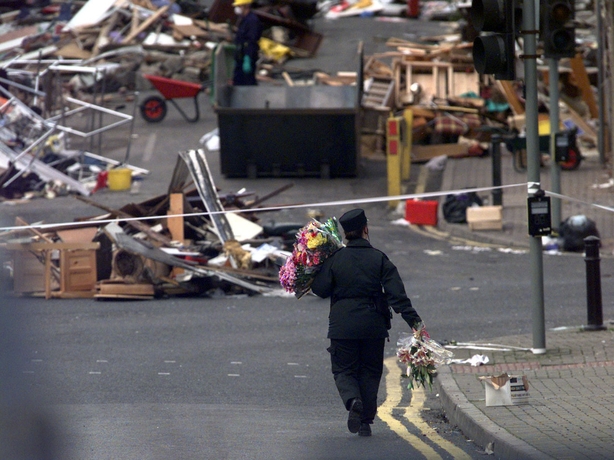A woman has told the Omagh bomb inquiry how she was trapped under the burning engine of the car that exploded and brought death and destruction to the Co Tyrone town on 15 August 1998.
Pauline Harte was a 19-year-old student who had a summer job in a shop close to the site of the explosion.
"The engine of the car used for the bomb landed on my legs, with the axle resting on my waist, and it was on fire. I was on fire underneath it," she told the inquiry with her husband Ronan by her side.
"I didn't know it was a fire, because fire has the colour yellow in it. I saw deep black, orange and red colours moving and it sounded as angry as it looked. My ears hurt and everything was muffled, people were screaming above the noise of the engine.
"I knew I was trapped and reached my hand down to see what was stopping me. I touched the bar across my stomach, and that is my first memory of the pain.
"The tar was melting around me and my elbow was sunk into it."
"My body is broken but I will be forever thankful that I don't have a broken heart"
She recalled how a group of men, including a number of police officers, had tried to free her and used water and fire extinguishers to put out the flames.
"One of the men told me later that he went home with my skin melted into his hands," she added.
Pauline had to have her lower left leg amputated and spent four months in hospital being treated for multiple injuries including third degree burns from the waist down.
She recalled the pain of her long physical recovery process.
"I remember the pain of the burns being so acute that I could feel the vibrations from someone walking in heels, it travelled up through my body until I could feel it in my teeth," she said.
"It was an agonising, searing pain, and when I closed my eyes everything was white."
Pauline praised the medical staff who treated her.
"Now 26 years later and looking back, my over-riding feeling is being in awe of what was done for me by so many people, and I think of them all often. They are the reason I exist and walk tall," she said.
She also spoke of the pain of having to witness the continuing suffering of those who lost loved ones in the explosion.
"I see us growing through the different ages that those who lost their lives in the bomb were at. I see their family members left behind to pick up the pieces," she said.
"My body is broken but I will be forever thankful that I don’t have a broken heart."

Afterwards inquiry chairman Alan Turnbull said people watching and listening to her statement would never have heard an account of such appalling physical injuries as those inflicted upon her.
He said her account had provided "the clearest understanding of the life-long pain and physical suffering" inflicted by the bomb.
"One can only hope that those responsible or those who condoned this atrocity will learn through the evidence heard in this inquiry of the real nature and effects of their acts on that day," he added.
Aftermath of Omagh bomb like 'a war zone', inquiry told
A woman who helped treat some of those injured in the Omagh bombing has told the public inquiry into the 1998 atrocity that the aftermath of the explosion was like a war zone.
Edel Doherty was in the Wellworth's store in the town centre shopping when the bomb exploded,
A short time later, police approached her as she walked along the street and asked if she had any first aid training.
"I followed him into Boots chemists where he directed me to lift anything that would absorb blood, like nappies and sanitary products," she said in a statement read by John Rafferty, a lawyer for the inquiry.
"I proceed to run carrying the products towards the area of the bomb. It was chaos. People were screaming, crying and I remember meeting ashen covered faces."
We need your consent to load this rte-player contentWe use rte-player to manage extra content that can set cookies on your device and collect data about your activity. Please review their details and accept them to load the content.Manage Preferences
The inquiry was told how she helped treat a number of people who had been seriously injured, including a young boy who she helped to a police Land Rover using a door that had been blown off a building as a makeshift stretcher.
Her statement said she carries the images of that day as if it was yesterday.
"They were horrendous. Body parts, pieces of flesh, broken bodies and water and blood gushing down the street, casualties with clothes blown off them, the walking wounded wandering around like zombies," it said.
"I felt that I was in the middle of something that was not real but at the same time I knew it was real and beyond anything that I could ever imagine."
Bomb victim could not attend sister's funeral due to her injuries
The sister of one of the victims has spoken of the pain of not being able to attend her funeral because she herself had been seriously injured.
Nicola Marlow had gone into town to buy concert tickets and had arranged to meet her older sister, 17-year-old Jolene, for lunch. Jolene was killed in the explosion.
In a statement read by a solicitor, Nicola Marlow said she had suffered life changing injuries that required many "gruelling surgeries" and have defined the rest of her life.
Read more:
Omagh inquiry: The victims remembered
The sisters walked past the car containing the huge bomb that devastated the town a short time before it exploded.
Nicola said she has carried a burden of guilt because her sister would not have been in the town if they had not been due to meet.
"The last time I saw my sister was standing side by side behind the car that would ultimately kill her and maim me," she said in the statement read by solicitor Emma Fox.
Survivor has 'constant fear of dying'
A woman who was seriously injured in the Omagh bombing has told the public inquiry into the atrocity that she now has a constant fear of dying and cannot unsee the scenes she witnessed that day.
The inquiry has started hearing the accounts of those who were caught up in the explosion on 15 August 1998, but survived.
A statement on behalf of Valerie Hamilton was read by Mr Rafferty.
She spent ten days in hospital being treated for shrapnel injuries all over her body, including serious wounds to her face and one eye.
The statement outlined the profound, long lasting impact of the injuries and trauma she suffered that day.

"For about five years I sat in the house not wanting to do anything. I felt angry and frustrated," Mr Rafferty read to the hearing in the Strule Arts Centre in Omagh.
Ms Hamilton's eyesight and hearing were damaged by the explosion, and she continues to suffer from severe anxiety.
"I am wary when in crowds. I will work out in my head where my nearest exits are as I need to know that I have an escape route," her statement added.
"I have a constant fear of dying ... I have myself worked up to a point of panic."
The inquiry was told that Ms Hamilton takes medication for anxiety caused by what she saw on the day of the explosion because that "can never be unseen".
'Just carnage', survivor recalls aftermath of Omagh bomb
Another survivor told the inquiry how he spent the day of the explosion helping the dying and the injured.
Ian Ferguson was working in his family's dry cleaning business in the town when they were told there was a warning of a bomb at the courthouse.
A short time later the windows of his shop were blown out by the force of the explosion.
Mr Ferguson told how he and a friend used fire extinguishers to put out the flames of the remains of the car that had exploded.
"From that it was just carnage, the squealing and crying, the smell of smoke. It was just terrible," he said.
He then spent the day carrying injured people to safety, and covering up the bodies of those who died.
Watch: Inquiry into Omagh bombing under way
"I don’t know how long, but I spent most of the day carrying people and putting people down the wee entry across from the shop," he said.
"There were people bleeding so I brought towels, blankets and anything I could get from the shop to use as bandages and help people.
"Again, I don’t know how long it lasted. I met the late Fr Mullan on the street, went back to the shop and got sheets for him. As he was giving people the last rites I was putting sheets over them."
He told the inquiry he began suffering depression shortly after the explosion and "have been fighting it ever since."
Chairman Mr Turnbull commended Mr Ferguson for his actions on the day.
"No-one would be able to picture or imagine such events had they not been there or heard from someone who was," he said.
"Although it must have been a scene of unimaginable horror your own actions in looking after the staff in your own shop and then immediately providing assistance to those who needed it in the street, and also helping to provide some dignity to those who died were all most commendable actions.
"I’m sure that many people in Omagh that day have much to be grateful to you for."






